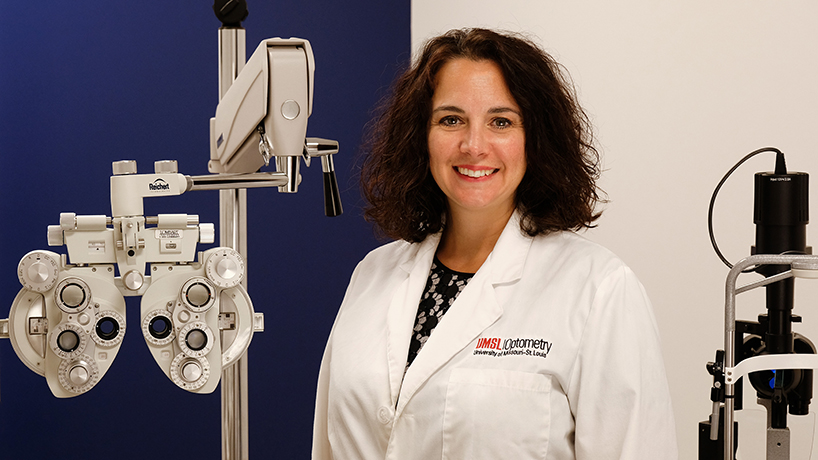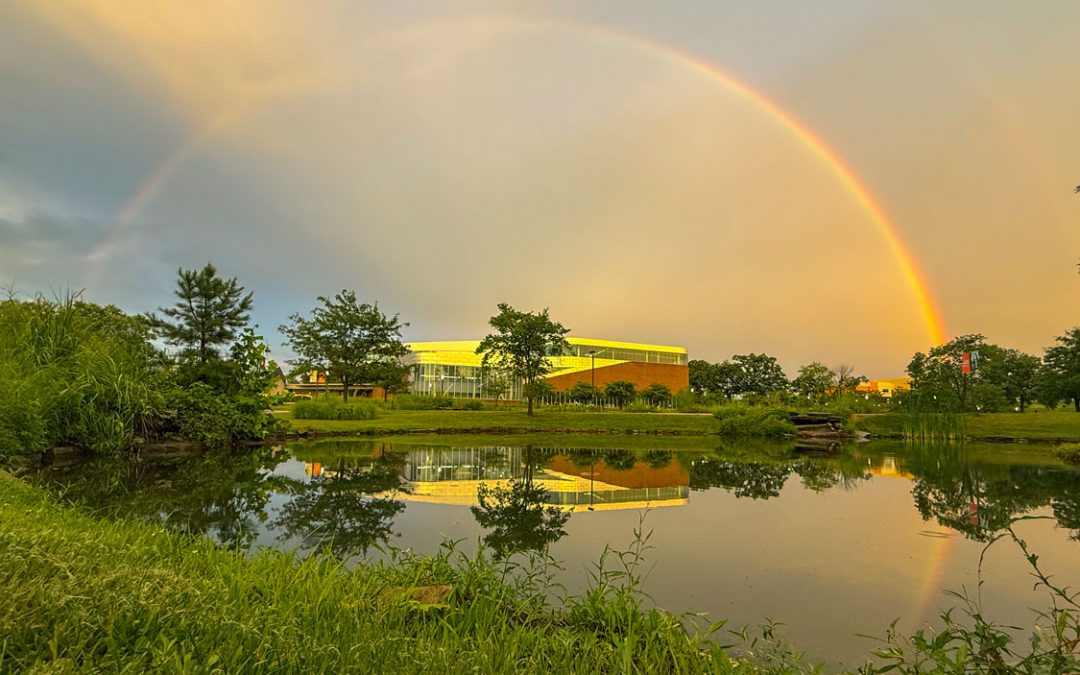
Julie DeKinder has been named vice chair of the Accreditation Council on Optometric Education. (Photo by August Jennewein)
After serving the Accreditation Council on Optometric Education with distinction for several years, Dr. Julie DeKinder has assumed a new role with the national organization.
DeKinder, a clinical professor of optometry, director of Academic Programs and Residencies and chief of Contact Lens Service at the University of Missouri–St. Louis College of Optometry, was named vice chair of the ACOE as of July 1. The organization is the only accrediting body for professional optometric degree programs and optometric residency programs (it also accredits optometric technician programs) and is responsible for setting the standards for the profession of optometry.
DeKinder was first appointed to the 11-person council in 2018 after training as a site consultant in 2005 and serving as team chair for several site visits. She says her interest in the accreditation process was informed by her own educational and professional experience in the optometry field, much of which has been conducted at UMSL. After completing a Cornea and Contact Residency at the UMSL College of Optometry – an ACOE-accredited program – she joined the faculty in 2005 and now oversees residences as part of her role. The accreditation process, she said, is fundamental to the very idea of both an optometric degree and a residency program.
“For those to have been impactful pursuits in my career, there has to be something that they are held up to,” she said. “Anybody could create a residency program, but if they don’t have any accreditation standards that they’re meeting – such as a defined mission, goals and objectives, an outlined curriculum that provides the appropriate educational components and clinical experiences, along with processes for the fair treatment of all candidates and residents in the program – then I don’t know what the benefit of completing a residency program would be.
“It’s important that students or young doctors that choose to do residency programs can say that they have completed an accredited residency program and it means something. Likewise, several new schools of optometry have opened in the last several years and more are likely to open. In order to maintain the level of educational standards needed to graduate qualified optometrists, there must be accreditation standards that every program has to be held to.”
DeKinder is intimately aware of those standards, and as vice chair of the ACOE, she will continue her duties as chair of the residency committee, a role she has filled since 2018. The ACOE conducts a comprehensive standards review process every five years, and she’ll lead the process to help the organization evaluate its standards for optometric residency programs. In addition, as part of her new role, she’ll become chair of the ACOE’s planning committee.
“It sounds like a lot when I say it out loud,” she said with a laugh. “But it’s a wonderful thing. The ACOE is probably the most rewarding optometric volunteer work I have ever participated in. It is absolutely, without a doubt, the hardest-working volunteer position I have ever been a part of, but when you’re doing good work for the profession, I don’t mind giving the time that it deserves.”
DeKinder’s work with the ACOE has made her even more of an asset to the College of Optometry. Since she’s so well-versed in residency standards – knowing what the council looks for or when there might be updates – she’s a major advantage when the UMSL-affiliated residency programs are undergoing reaccreditation. She has also helped guide three new affiliated residency programs in the development of their self-study, the cornerstone of the initial accreditation process. UMSL’s OD program will also be going up for reaccreditation in a few years, and DeKinder is already considering how she can make sure it not just meets, but exceeds, those standards.
While she’s certainly keeping herself busy between her role at UMSL and her volunteer work with the ACOE, DeKinder said she was humbled to take on this new position.
“I hope that my actions and the thought and the time I put into it show,” she said. “I hope that I can continue to have the respect of my optometric peers and others through my work with accreditation and that I can always keep what’s best for the profession of optometry in mind with every accreditation decision I make on the council – and they’re not always easy decisions.
“But at the end of the day, you have to take it back to the standards and make sure programs are meeting the standards and consider the overall health and wellbeing of the profession. I’m very passionate about it, and I want optometry to continue to be the best profession out there. I want all programs, whether OD programs or residency programs, to be graduating and producing the best doctors we can.”














